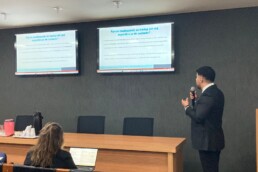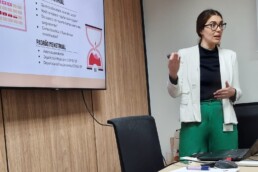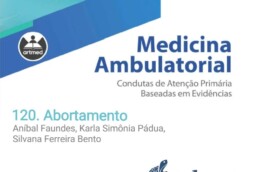In many countries around the world, women and girls who need to undergo abortions in advanced gestational stages face significant barriers to accessing safe services. These women and girls are among the most vulnerable, often subjected to increased stigmatization and persecution, and experience more severe complications and higher mortality rates when forced to resort to unsafe abortion practices.
Restrictive laws that deviate from the World Health Organization (WHO) recommendations against imposing deadlines, combined with a shortage of trained professionals, further exacerbate injustices against these individuals. In regions where legislation allows for the provision of safe abortion services in later stages of pregnancy, it is the ethical and professional duty of healthcare providers to advocate for access and quality, and to challenge any barriers that worsen existing structural factors.
In Brazil, induced abortion is legal under three circumstances: when the pregnancy results from rape, when there is a risk to the life of the pregnant person, and when there is a diagnosis of fetal anencephaly. In these three circumstances, there is no gestational age limit to access the right to a safe abortion according to Brazilian law. However, the Federal Council of Medicine of Brazil recently issued a resolution prohibiting the induction of fetal asystole for legally induced abortions, undermining these rights.
The Ban is Unethical and Contradicts Medical Evidence
FIGO expresses its deep concern over the recent resolution issued by the Federal Council of Medicine of Brazil that prohibits the induction of fetal asystole for legally induced abortions. This ban in Brazil is unethical and contradicts medical evidence.
For abortion procedures performed after 20 weeks of gestation, scientific evidence supports considering the induction of fetal asystole to prevent signs of life during a medical (induced) abortion or fetal expulsion after cervical preparation but before a planned dilation and evacuation (DE) procedure. The likelihood of transient neonatal survival after expulsion increases with gestational age and the interval between cervical preparation and the abortion. For medical abortion beyond the limit of viability, the induction of fetal asystole should always be an option.
The ban prevents access to quality abortion services for women with advanced (beyond viability) pregnancies who otherwise have the right to legal abortion in Brazil. The induction of fetal asystole in advanced induced abortions is an essential component of standard quality care and aligns with the intended outcome of the abortion, which is never a live birth.
The ban prevents obstetricians and gynecologists from adhering to the ethical principle of beneficence. It is well-established that safe induced abortion is safer than childbirth, even at advanced gestational ages. Terminating a pregnancy without inducing fetal asystole constitutes the induction of a premature live birth (which by definition is not an abortion). Without the induction of fetal asystole, abortions beyond the limit of viability become impossible to perform, forcing women to either continue the pregnancy and face the risks of full-term delivery and forced motherhood, or resort to very unsafe abortions. Thus, the ban violates women’s right to access and benefit from modern scientific technologies for a safe abortion.
The Ban Violates Ethical Principles
The ban contravenes the ethical principle of non-maleficence by potentially exposing the woman and the newborn to the harms of prematurity if advanced pregnancies are terminated without inducing fetal asystole. Terminating an advanced pregnancy without inducing fetal asystole could result in transient signs of life or even survival, with all the complications associated with prematurity (including respiratory distress, patent ductus arteriosus, severe intraventricular hemorrhage, necrotizing enterocolitis, late-onset sepsis, bronchopulmonary dysplasia requiring supplemental oxygen, and retinopathy). The induction of fetal asystole is therefore necessary to prevent avoidable risks to newborns and ensure non-maleficence, as well as to avoid legal implications for doctors who face caregiving obligations with neonates showing signs of life.
The ban indeed violates the prohibition of torture or other cruel, inhuman, or degrading treatment as established by the United Nations Human Rights Council. Banning the induction of fetal asystole could compel obstetricians and gynecologists to refuse to provide legally requested abortions due to their commitment to avoid causing harm to the newborn. Such refusal would constitute a violation of the pregnant person’s right to be free from torture or other cruel, inhuman, or degrading treatment or punishment.
The ban promotes the false assumption that studies on premature infants are applicable to aborted fetuses, using the rhetoric of viability. Viability is a medical concept relevant only to neonatal care and intensive care in the context of spontaneous or medically indicated preterm birth. It is not relevant to induced abortions. Even in applicable contexts, preterm birth is a last-resort measure in obstetrics, as any harm to the newborn, no matter how minimal, should be avoided. The studies on premature children cited in the resolution of the Federal Council of Medicine of Brazil pertain to inevitable preterm births and should not be generalized to aborted fetuses. This intentional misinterpretation also trivializes the risks associated with prematurity.
Impact on Public Health
The ban will negatively impact public health indicators by potentially falsely increasing neonatal and infant mortality and morbidity rates.
Ensuring Safe and Respectful Care
FIGO reiterates that the induction of fetal asystole should be considered and legally permitted as a therapeutic intervention to ensure a safe, medically induced abortion at advanced gestational stages when extrauterine viability is possible. This practice allows for care that respects the autonomy of the pregnant person and protects them from any harm. Banning fetal asystole—resulting in the risk of live births from legal abortion requests—undermines access to safe abortion care. In Brazil, it deprives healthcare professionals of the ability to advocate for the rights of women and girls as recognized by Brazilian legislation. This ban exacerbates social disparities and injustices: it sets a dangerous precedent for the entire region, threatening the significant advances made in this area in recent years.
References:
- World Health Organization (WHO). Clinical practice handbook for quality abortion care. Geneva: WHO, 2023. Available at: www.who.int/publications/i/item/9789240075207nbsp;
- World Health Organization (WHO), International Classification of Diseases 11th Revision (2022). The global standard for diagnostic health information. Available at: https://icd.who.int/browse11/lm/en#/http://id.who.int/icd/entity/151711…;
- Bartlett LA, et al. Risk factors for legal induced abortion-related mortality in the United States. Obstet Gynecol. 2004 Apr;103(4):729-37.
- CESCR. General Comment Nº 25: Science and economic, social and cultural rights. Article 15(1)(b), (2), (3) and (4) of the International Covenant on Economic, Social and Cultural Rights. United Nations, 2020 (UN Doc. E/C.12/GC/25).
- Stoll BJ, et al; Neonatal outcomes of extremely preterm infants from the NICHD Neonatal Research Network. Pediatrics. 2010 Sep;126(3):443-56.
- United Nations. General Council. Human Rights Council. A/HRC/22/53. Report of the Special Rapporteur on torture and other cruel, inhuman, or degrading treatment or punishment, Juan E. Méndez. Paragraphs 49 and 50.
- Nuffield Council of Bioethics. Critical care decisions in fetal and neonatal medicine: ethical issues. London: Nuffield Council of Bioethics, 2006.
- Romanis EC. Is ‘viability’ viable? Abortion, conceptual confusion and the law in England and Wales and the United States. J Law Biosci. 2020 Oct 9;7(1): lsaa059.
- Brumbaugh JE,et al. Outcomes of Extremely Preterm Infants With Birth Weight Less Than 400 g. JAMA Pediatr. 2019 May 1;173(5):434-445.
- Tyson JE, et al.; National Institute of Child Health and Human Development Neonatal Research Network. Intensive care for extreme prematurity–moving beyond gestational age. N Engl J Med. 2008 Apr 17;358(16):1672-81.
† Although the ban on the induction of fetal asystole by the Federal Council of Medicine is not a law in Brazil, it is valid nationwide for all Brazilian doctors. Since in Brazil legally induced abortions must only be performed by doctors according to the text of the law, the resolution published by the Federal Council of Medicine ultimately restricts medical practice concerning induced abortions.
‡ The concept of viability is variable and depends on the context and available technology.









